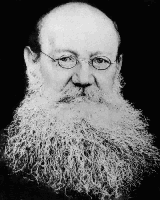|
While returning to Russia he joined a revolutionary group who spread propaganda
under the workers in St. Petersburg and Moscow. He was arrested 1874 in
a police action, but managed two years later his famous escape to West
Europe. His name soon became famous under the anarchist movements there.
The next years he spent mostly in Switzerland until he was expelled at
the demand of the Russian government after the assassination of Alexander
II. in 1881. After a while in France he moved to England where he stayed
until the revolution 1917 in Russia made it possible again for him to
enter his native country. He was now 75 years old and spent more than
40 years in exile. The new government offers him a job as secretary of
education, but he harshly refused. In Russia everywhere communes and soviets
(kind of worker and soldier unions) got started which could be the foundation
for a classless society. His hopes for a libertarian future were never
brighter. The new government however was for him only an example how NOT
to do a revolution, authority instead of liberalism. Kropotkin died in
1921 in Dmitrov, a village near Moscow. Tens of thousands joined his funeral
and that was the last event when the black flag of anarchy waved over
the Russian capital.
Kropotkin
always kept up the high moral standard and his combination of though and
action that he preached in his books. He was one of the most significant
founders of the Russian and English anarchist movements and was a big
influence for the movements in Switzerland, France and Belgium. He did
neither show egoism nor lust of power unlike many other revolutionaries.
Especially because of that he was not only admired by his comrades but
also by people we usually connected anarchism with violence and bombing.
Kropotkin and
his theories of evolution, education and anarchist communism
"Mutual Aid"
While in exile in Europe he wrote several books, for example "Paroles
d'un révolté" (1885: "Words of a rebel"), "The conquest
of the bread" (1892) and "Memoires of a revolutionary" (1899). His most
famous work was "Mutual Aid", a book which which he comes close to his
goal to give anarchism a scientific basis. In this book he opposes the
Darwin theory that only the strongest and toughest can keep up with the
evolution.His view is that not rivalry but mutual aid is the key factor
for survival. With many examples he shows that socializing rather than
rivalry dominate. Even in the human world is mutual aid more the rule
than the exception. Kropotkin traces the mutual aid back from primitive
tribes over early villages, communes to the present with the unions, the
Red Cross and so on. He believes that the trend of the modern world goes
back to decentralized, unpolitical, cooperative societies, in which people
can be creative by themselves without influence from bosses, soldiers,
priests and other positions of power.
"Anarchist communism"
Kropotkin developed the economic thought of anarchism significant further
and made his theory of "anarchist communism".
Private property and unequal wages would be changed with the free distribution
of all goods and services. Instead of the principle of money he believed
in the principle of needs. Everybody should decide themself how much he
needs and should take so much out of a store, no matter how much labor
he invested. Kropotkin's vision was that all members of a cooperative
society would work from 20 to 40 for about 4 to 5 hours a day in a profession
they prefer. That should be enough for a happy life without any problems.
Education and
penal system
to prepare people for his kind of life, he set all his hopes in the youth.
He wanted to create an education that stressed humanity, mathematics and
science and taught them mental and mechanic skills without learning only
from books. The learning should be outside with active engagement and
real experiences, a suggestions that is picked up today by many education
scholars.
Due to his own experiences in prisons he was for a reform of the penal
system. He calls prisons "crime schools" which, instead change people
back to good citizens, punish them brutally and harden them in criminal
ways. In his view the criminals would not be changed by laws and prisons
but by human understanding and the moral pressure of society.
Sources:
- Martin A. Miller "Kropotkin" (1976)
- George Woodcock and Ivan Avakumovic "the Anarchist Prince" (1950)
- Encyclopedia Britannica "Kropotkin, Peter Alekseyevich"
more information
about Kropotkin:
his work "Mutual
Aid" complete
some
of his essays
|
